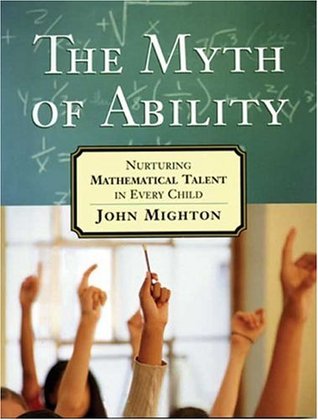This book, by John Mighton (founder of JUMP math), arrived at the beginning of the summer holidays. I found JUMP math (and have used some of its ideas in the classroom) several years ago, and I've been interested in reading more ever since.
John Mighton struggled with math as a child - he was convinced he didn't have the right kind of 'mathematical mind' to do well in the subject. He tells of receiving a 'D' in Calculus at university, and deciding to give up on the subject all together. I can relate - my worst grade at uni was in my freshman year Calculus class. My children roll their eyes when I tell the story of calling my mom, in tears, at 5:30 am before an 8 am Calculus exam, to tell her that I was going to fail the upcoming test. I was right - fail it I did...and like Mighton, I decided against taking any more math classes at uni (although I did manage to pass the course overall!).
As an adult, Mighton was an aspiring playwright - a profession that didn't exactly pay the bills. So to make ends meet, he began to tutor children in math. Eventually, he put together a group of tutors, and they began working with a group of elementary age children who were failing badly in math.
By breaking everything down into tiny, easy to follow steps, Mighton and his tutors were able to help their students achieve in maths. And as the students felt the power of their own achievement - as they began to believe that they were 'smart' at math - they continued to achieve.
How many of our students are afraid of math, and feel that they 'aren't any good at it'? And what impact does that attitude have on the effort they are willing to put into learning math?
John Mighton struggled with math as a child - he was convinced he didn't have the right kind of 'mathematical mind' to do well in the subject. He tells of receiving a 'D' in Calculus at university, and deciding to give up on the subject all together. I can relate - my worst grade at uni was in my freshman year Calculus class. My children roll their eyes when I tell the story of calling my mom, in tears, at 5:30 am before an 8 am Calculus exam, to tell her that I was going to fail the upcoming test. I was right - fail it I did...and like Mighton, I decided against taking any more math classes at uni (although I did manage to pass the course overall!).
As an adult, Mighton was an aspiring playwright - a profession that didn't exactly pay the bills. So to make ends meet, he began to tutor children in math. Eventually, he put together a group of tutors, and they began working with a group of elementary age children who were failing badly in math.
By breaking everything down into tiny, easy to follow steps, Mighton and his tutors were able to help their students achieve in maths. And as the students felt the power of their own achievement - as they began to believe that they were 'smart' at math - they continued to achieve.
How many of our students are afraid of math, and feel that they 'aren't any good at it'? And what impact does that attitude have on the effort they are willing to put into learning math?


 RSS Feed
RSS Feed